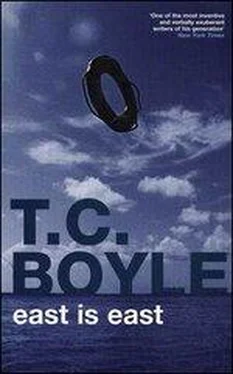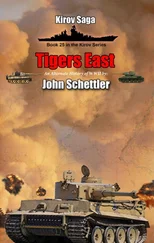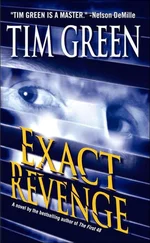Tom Boyle - East is East
Здесь есть возможность читать онлайн «Tom Boyle - East is East» весь текст электронной книги совершенно бесплатно (целиком полную версию без сокращений). В некоторых случаях можно слушать аудио, скачать через торрент в формате fb2 и присутствует краткое содержание. Жанр: Современная проза, на английском языке. Описание произведения, (предисловие) а так же отзывы посетителей доступны на портале библиотеки ЛибКат.
- Название:East is East
- Автор:
- Жанр:
- Год:неизвестен
- ISBN:нет данных
- Рейтинг книги:5 / 5. Голосов: 1
-
Избранное:Добавить в избранное
- Отзывы:
-
Ваша оценка:
- 100
- 1
- 2
- 3
- 4
- 5
East is East: краткое содержание, описание и аннотация
Предлагаем к чтению аннотацию, описание, краткое содержание или предисловие (зависит от того, что написал сам автор книги «East is East»). Если вы не нашли необходимую информацию о книге — напишите в комментариях, мы постараемся отыскать её.
, praised by
in
as "one of the most exciting young fiction writers in America," the result is a sexy, hilarious tragicomedy of thwarted expectations and mistaken identity, love, jealousy, and betrayal.
East is East — читать онлайн бесплатно полную книгу (весь текст) целиком
Ниже представлен текст книги, разбитый по страницам. Система сохранения места последней прочитанной страницы, позволяет с удобством читать онлайн бесплатно книгу «East is East», без необходимости каждый раз заново искать на чём Вы остановились. Поставьте закладку, и сможете в любой момент перейти на страницу, на которой закончили чтение.
Интервал:
Закладка:
Hiro, however, had no intention of winding up in that mainland cell—or in any other, for that matter. When they were finished with him, when they were hunkered down over their chili beans and barbecue and generic beer, when the hypnotic voice of the TV murmured from every porch and window and even the dogs grew drowsy and stuporous, that was when he would make his move. That was when he would scale the wall one last time and drop catlike into the adjoining cell to try his luck on the outer door, all the while praying that it wouldn’t be locked. And it wouldn’t be. He knew that already. Knew it as positively and absolutely as he’d ever known anything in his life, knew it even as he let his exhaustion catch up to him and he drifted off to sleep. It was just the sort of detail the butter-stinkers would overlook.
He woke to a sharp thrust of light and a sudden escalation of heat as withering as the blast of an oven. His sleep had been deep and anonymous and they took him by surprise, the tall one with the rodent’s eyes and his runt of a companion. It must have been late in the afternoon, shadows lengthening in the barn that enclosed the cell, a flash of electric green just perceptible in the moment the door swung open to reveal the great gaping wagonhigh entranceway to the barn itself. Hiro sat up. His clothes were wet through, his throat parched. “Water,” he croaked.
The tall one shut the door and the day was gone. The little man laughed. He had something in his hand—a tape player, Hiro saw now, Japanese-made and big as a suitcase—and he maneuvered round Hiro to set it beside him on the wooden bench. The little man’s smile had changed—it was a cruel smile, unstable, no longer bemused. Were they going to force a confession out of him as the police did in Japan? Were they going to tape it and edit out the groans and screams and cries for mercy? Hiro edged away from the thing. But then, flexing the muscles of his neck and shoulders, the little man reached out to depress a button atop the machine and immediately the cell swelled with music, disco. Hiro recognized the tune. It was—
“Donna Summer,” the little man said, flexing and grinning. “You like it?”
This time, they questioned him for what seemed like days, but what actually must have been closer to two hours, Hiro later realized. They asked him the same questions they’d asked him earlier, over and over again. Questions about his politics, about Honda and Sony and Nissan, about Ruth and Ambly Wooster and the old Negro and the accident at the shack. And all the while the disco beat drummed in his head and his voice cracked around the parched kernel of his throat. They held out the promise of water as a bargaining chip—if he cooperated he would be rewarded; if not, they’d watch him die of thirst and never lift a finger. He cooperated. He told them, over and over again, about Chiba and Unagi and Ruth and her lunches and everything else he’d told them a hundred times over, only this time he told it with Donna Summer and Michael Jackson for accompaniment. Every once in a while he would say something that struck the little man and the little man would interrupt him to give the tall one a look and say, “See? What’d I tell you? Squarest in the world.” They left him a Tupperware pitcher of tepid water and another Hardee’s bag, this one filled to the grease-spattered neck with twists of cold greasy potato and two geometrically perfect hamburgers.
Hiro forced himself to eat. And he drank down the water too, every drop: he didn’t know when—or if—he’d see more. There were two deputies outside the door—he’d seen them when his inquisitors had let themselves in and out of the cell. He could hear the soft murmur of their voices, smell the flare of their tobacco. Twenty minutes. He would give them twenty minutes to eat their corn dogs and piccalilli and butterscotch ripple ice cream, twenty minutes to stupefy themselves with gin and whiskey and beer. Then he would make his break.
He counted out each of those interminable minutes, second by second— one a thousand, two a thousand, three —and he heard the faint but distinctive hiss of pop-tops, and there was the smell of hot grease and more tobacco, and then the murmur of voices faded away to silence. The time had come. The time for action. The time when a man of action must make up his mind within the space of seven breaths. Hiro only needed one. He sprang for the wall, clambering up the slick stones like a lizard, removed the false bars and squeezed through into the adjoining cell. Head first, then shoulders and torso and the right leg, then reverse position and drop lightly to the bench below. His blood was singing. He was moving, acting, in control of his own destiny once again—and the door? His fingers were on the rusted handle, his thumb poised over the latch—it was the moment of truth, the moment on which all the rest depended. He pressed: it gave. Ha!
Rusty hinges. Open a crack. Look. There, leaning back in a chair propped against the door of the first cell, was a deputy, red hakujin face and wheat-colored mustache, pointy nose and slivered lips. His head was thrown back, the cigarette smoking between his fingers, the can of beer and grease-stained bag at his side, and his breathing was deep and regular, somnolent, breath caught in the pit of the larynx and released again with the faintest stertor. Yes: the long-nosed idiot was asleep!
Hiro almost swaggered when he realized it: asleep! But he contained himself—discipline, discipline—and slipped out the door like a shadow, a ninja, the nimblest assassin ever to float over two feet. But what of the other guard? What of him? He was nowhere to be seen. Stealthy, stealthy. The red cheeks and flaming nose, the air sucked down the tubes and vomited out again: Hiro couldn’t resist. He bent over the sleeping deputy and slipped the cigarette from between his fingers, justifying it to himself as a precaution: it was only a matter of a minute or two before the fool singed himself awake. But the chicken—it was chicken, breaded and fried, wings, drumsticks and thighs, in the grease-stained bag—the chicken was another matter. Casually—as casually as Yojimbo hiking up his yukata or Dirty Harry scratching his stubble—Hiro leaned forward to pluck a drumstick from the bag, savoring the moistness of it as he eased along the inner wall, looking for a door that would give onto the yard out back.
And what was here? A shadowy vastness, rafters and crossbeams, a smell of urine, fungus, the body functions of animals dead a hundred years. He moved to his left, away from the deputy and the glaring high double doors of the barn’s main entrance, flattening himself against the cool stone wall. The place was deserted: an ancient pitchfork against the damp wall, the stalls where livestock had once been kept, the odd strands, like fallen hair, of antediluvian hay. Something stirred in the rafters overhead and he looked up into the slatted shadows to see a pair of swallows beating through the gloom. And the other deputy? Hiro was light on his feet, invisible, a ghost in the place of ghosts. At the end of the line of stalls a weak light leaked round the corner and down a hallway. Hiro made for it.
He turned down the hallway to his right, proud and scornful and ready for anything—he was escaping, escaping again!—and the light swelled to embrace him. There was a doorway there, vacant and bleeding light—a doorless doorway, the wooden slab with its latch and handle apparently lost to some ancient hakujin cataclysm. Beyond the doorway he saw green—the virescent glow of freedom in all its seething jungle urgency—and he hurried for it.
But it wasn’t as easy as all that.
He paused in the crude stone doorframe, glanced right and left—a driveway, cars, shrubs, trees, lawn—and then made his break, bolting for the band of vegetation that rose up at the far end of the lawn, thick and reclusive and no more than a hundred feet away. He was bent low and scurrying like a crab, already ten steps out of hiding and exposed for all the world to see, when suddenly he froze. There was a dog there, right in front of him, lifting its leg against a tree. A dog. Better than forty dogs, better than the snarling seething pack that had closed in on him at Ruth’s, but a dog nonetheless—and no lap dog either, but a big raw-boned gangling shepherd sort of thing that looked as if it had been put together with spare parts. The dog finished its business in that moment and Hiro saw its eyes leap with something like recognition as it loped toward him, a woof—a tiny grandfatherly woof—rippling from its throat. Hiro was planted, rooted, he’d grown up out of the ground like a native shrub, hopeless and immobile. The woof would become a concatenation of woofs, an improvisatory riff of woofing, followed by bared teeth and the bloodcurdling howls and the angry voices of discovery, while through it all the clink of handcuffs played in counterpoint. Was this it? Was it over already?
Читать дальшеИнтервал:
Закладка:
Похожие книги на «East is East»
Представляем Вашему вниманию похожие книги на «East is East» списком для выбора. Мы отобрали схожую по названию и смыслу литературу в надежде предоставить читателям больше вариантов отыскать новые, интересные, ещё непрочитанные произведения.
Обсуждение, отзывы о книге «East is East» и просто собственные мнения читателей. Оставьте ваши комментарии, напишите, что Вы думаете о произведении, его смысле или главных героях. Укажите что конкретно понравилось, а что нет, и почему Вы так считаете.











